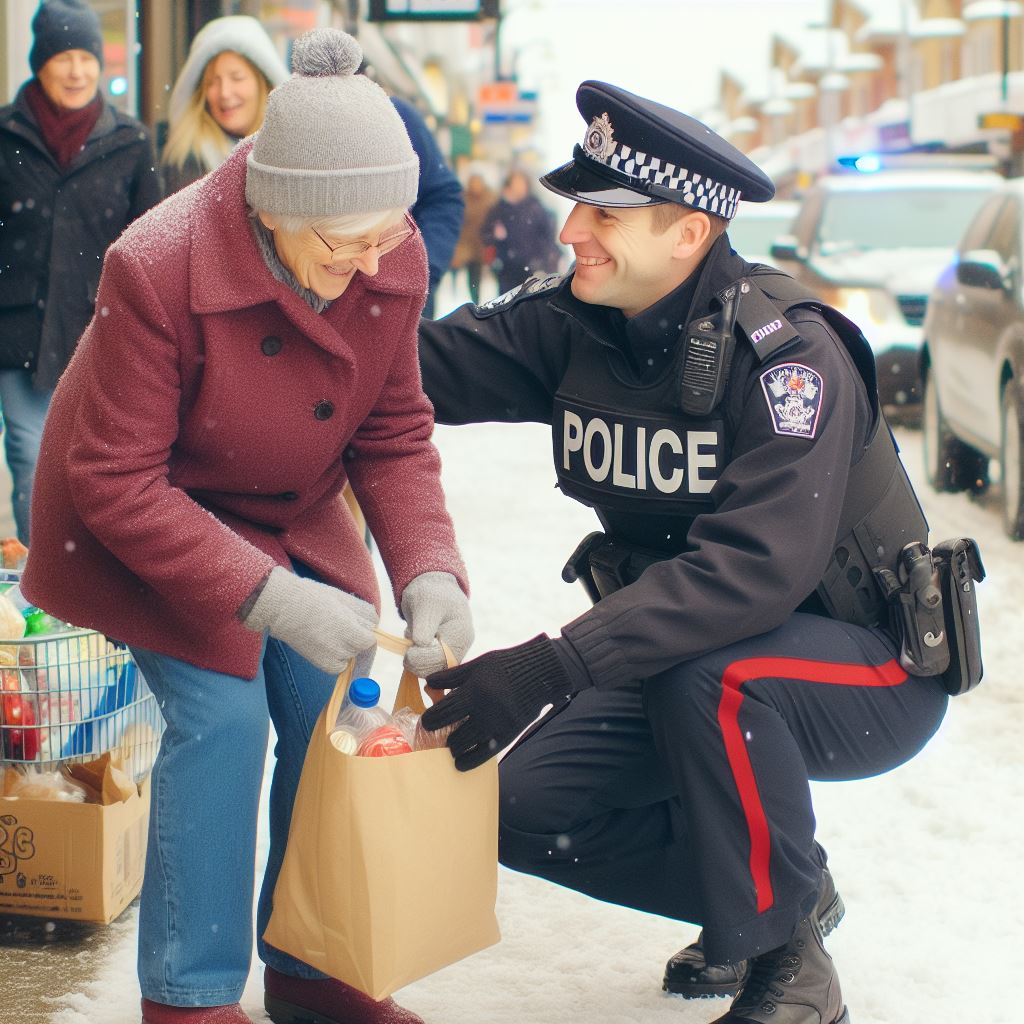A Day in the Life of a Canadian Policeman
Last Updated on January 28, 2024
Introduction
A day in the life of a Canadian policeman offers a glimpse into the vital responsibilities and challenges they face.
Understanding their daily routine is crucial to appreciating their contributions to society.
Understanding their daily grind isn’t just about curiosity; it’s about appreciating the dedication and resilience that keeps our communities safe.
This blog peels back the blue, revealing the complexities, triumphs, and unexpected moments that define a Canadian policeman’s day.
Expect the unexpected. We’ll navigate the adrenaline rush of responding to emergencies, the delicate dance of conflict resolution, and the quiet moments of community engagement.
We’ll witness the emotional toll, the unwavering commitment, and the deep satisfaction of serving their fellow Canadians.
By gaining insight into their work, readers can develop a greater understanding and appreciation for the role of Canadian policemen.
Job Overview
Canadian policemen play a crucial role in maintaining law and order in communities across the country.
They are responsible for ensuring the safety and security of the citizens.
Primary Duties and Responsibilities
- Enforcing Laws: Canadian policemen are responsible for enforcing federal, provincial, and municipal laws. They patrol neighborhoods, monitor traffic, and respond to emergency calls.
- Crime Prevention: Policemen work proactively to prevent crime by conducting regular patrols, engaging with the community, and implementing crime prevention programs.
- Investigation: In the event of a crime, policemen gather evidence, interview witnesses, and build a case to identify and apprehend suspects.
- Emergency Response: They are often the first responders to emergencies such as accidents, domestic disputes, and crimes in progress. They provide immediate assistance and ensure public safety.
- Traffic Control: Policemen manage traffic flow, control intersections, and issue tickets for traffic violations. This helps maintain safety on roads and mitigate congestion.
- Public Safety: They are responsible for maintaining public order during demonstrations, festivals, and community events. Their presence ensures peaceful gatherings and minimizes the risk of any disturbances.
- Assistance to Victims: Policemen offer support to victims of crimes or accidents, providing guidance, information, and connecting them with appropriate resources for additional assistance.
- Documentation: They are required to maintain detailed records of incidents, arrests, and investigations. This documentation is crucial for legal proceedings and statistical analysis.
Significance of Maintaining Law and Order
Maintaining law and order is vital for creating safe and harmonious communities.
- Protection of Citizens: A strong police presence deters criminal activities and ensures the safety of individuals and their property.
- Crime Reduction: By effectively enforcing laws, policemen help reduce crime rates, making neighborhoods more secure and attractive for both residents and visitors.
- Trust and Confidence: When citizens feel safe in their communities, they develop trust and confidence in their police force. This leads to stronger community relationships and cooperation.
- Social Stability: Maintaining law and order prevents social disorder, promoting stability and peaceful coexistence among diverse groups.
- Economic Growth: Safe communities attract investments and businesses, leading to economic growth and prosperity for the region.
- Prevention of Society’s Breakdown: By addressing crime and maintaining order, policemen prevent the breakdown of society’s norms and values, fostering a civilized environment.
- Protection of Human Rights: Policemen protect human rights by ensuring that everyone is treated fairly and justly under the law.
In short, Canadian policemen are essential in maintaining law and order to create safe and thriving communities.
Their duties encompass enforcing laws, preventing crimes, responding to emergencies, and supporting victims.
By upholding law and order, they contribute to social stability, economic growth, and the protection of citizens’ rights.
Read: Top Universities for Aspiring Policy Analysts
Morning Routine
Each day starts early for a Canadian policeman, as they have a strict morning routine to follow.
Waking up
The alarm clock rings at 5:00 am, jolting the policeman out of a deep sleep.
Physical fitness
Physical fitness is a top priority, so the policeman begins the day with a vigorous workout.
Morning exercises
A combination of cardio, strength training, and stretching exercises is performed to stay in top shape.
Healthy breakfast
After exercising, the officer enjoys a nutritious breakfast to fuel their energy for the day ahead.
Briefings and updates
Next, it’s time for an important part of the morning – attending briefings and receiving updates.
Ongoing cases
Detailed information about ongoing cases is shared, ensuring everyone is up to date and prepared.
Reviewing data and files
The officer spends some time reviewing data and files related to their assigned cases for the day.
Equipments check
Before heading out, a thorough check of all the necessary equipment is conducted for safety.
Power of teamwork
Collaboration with fellow officers is vital, so the team discusses strategies and identifies potential challenges.
Communication devices
Officers check and ensure their communication devices are working properly for uninterrupted connectivity.
Uniform inspection
The officer ensures that their uniform is properly ironed, clean, and presentable.
Ready to serve
With the morning routine complete, the Canadian policeman is now ready to hit the streets and serve their community.
The morning routine sets the tone for the rest of the day, emphasizing the importance of physical fitness, staying updated on ongoing cases, and fostering teamwork among officers.
By starting their day with structure and discipline, Canadian policemen are prepared to tackle any challenges that come their way.
Read: Policy Analyst Salaries in Canada: An Overview
Patrol Hours
During patrol hours, Canadian policemen carry out a variety of tasks to ensure public safety.
- They patrol designated areas, keeping an eye out for any signs of criminal activity.
- Responding promptly to emergency calls is another critical responsibility the officers hold.
- High visibility plays a crucial role as it deters potential criminals and reassures the community.
- Policemen are always on the lookout for suspicious behavior or individuals to maintain public order.
- They may stop vehicles for traffic violations or to investigate potential criminal activity.
- Officers enforce laws by issuing citations and, when necessary, make arrests.
- Community engagement is an essential aspect of patrol; policemen interact with residents to build trust.
- They provide information, assist with inquiries, and address concerns raised by community members.
- Policemen maintain a proactive approach by conducting foot patrols to ensure safety in crowded areas.
- In situations requiring quick response, officers utilize sirens, lights, and speed to reach the scene promptly.
Encountering a diverse range of situations is not uncommon for officers during patrol hours.
- Medical emergencies are frequent occurrences; policemen provide initial aid until medical professionals arrive.
- Traffic accidents necessitate the officers’ presence to investigate and redirect traffic flow.
- Confrontations between individuals may require the intervention of policemen to maintain peace.
- Domestic violence cases demand sensitive handling, protection of victims, and apprehension of the aggressor.
- Dealing with intoxicated individuals who present a danger to themselves or others is another challenge faced on patrol.
- Searching for missing persons involves significant coordination with other agencies and thorough investigations.
Each day, Canadian policemen navigate through a mix of routine tasks and unforeseen events during patrol hours.
Responding to Calls
Efficient and Swift Actions
Canadian policemen exhibit a rapid response when it comes to emergency calls. They promptly and efficiently address the situation at hand.
Adrenaline Rush and Quick Decision-Making
Responding to urgent situations demands rapid decision-making and quick thinking from Canadian policemen.
The adrenaline rush they experience enhances their ability to make instant decisions.
Problem-Solving Skills in Action
During emergency responses, problem-solving skills play a crucial role for Canadian policemen.
They must assess the situation and find effective solutions promptly.
Effective Communication for Better Outcomes
Communication is vital in any emergency response.
Canadian policemen excel in conveying clear instructions and information to ensure effective coordination with their colleagues.
Utilizing Technology and Navigation
Canadian policemen utilize advanced technology and navigation systems to reach the emergency location swiftly and efficiently.
Collaborative Efforts for Safety
Teamwork plays a significant role in emergency responses, and Canadian policemen ensure seamless collaboration with other emergency services to ensure public safety.
Prioritizing Lives and Property
Canadian policemen prioritize the safety of individuals and property during emergency calls.
They work diligently to mitigate potential risks and minimize damages.
Assessing the Severity of Situations
Upon receiving an emergency call, Canadian policemen rapidly evaluate the severity of the situation to administer the appropriate level of response.
Adaptability in Dynamic Situations
Emergency situations are unpredictable, requiring Canadian policemen to adapt quickly to changing circumstances and make necessary adjustments.
Continual Training for Enhanced Responses
Canadian policemen undergo regular training to sharpen their response skills, allowing them to efficiently handle a variety of emergency situations.
Emotional Resilience
Responding to emergency calls can be emotionally challenging, but Canadian policemen are trained to remain resilient and composed in high-pressure situations.
Assisting and Supporting Victims
Canadian policemen provide immediate assistance and support to victims in emergency situations to ensure their well-being and offer comforting reassurance.
Learning from Each Call
Every emergency call offers a learning opportunity for Canadian policemen, allowing them to continually improve their response strategies and techniques.
Documentation and Analysis
Following the completion of an emergency response, Canadian policemen document and analyze the incident to identify areas for improvement and share insights with colleagues.
Reflecting on the Day’s Challenges
At the end of a shift, Canadian policemen reflect on the challenges faced during emergency responses, reinforcing their commitment to public service and personal growth.
The Reward of Helping Others
Despite the demanding nature of their profession, Canadian policemen find fulfillment in knowing they made a difference in someone’s life during emergency calls.
Responding to emergency calls requires Canadian policemen to demonstrate quick decision-making, problem-solving skills, and effective communication, while adapting to dynamic situations with resilience.
Their swift actions prioritize public safety, and each response offers a chance to learn and improve.
Through teamwork, technology, and emotional support, Canadian policemen make a significant impact in their communities, ensuring a safer environment for all.
Read: How to Become a Policy Analyst in Canada

Investigations and Follow-ups
Canadian police officers play a vital role in ensuring justice:
- Evidence Gathering: They collect physical, digital, and testimonial evidence for a robust case.
- Interviewing: Skillfully questioning suspects and witnesses to extract relevant information.
- Information Analysis: Carefully examining gathered data to identify patterns, connections, and potential leads.
- Interagency Collaboration: Collaborating with forensic experts and special units to enhance investigations.
- Technology Use: Relying on sophisticated tools like forensic software and surveillance systems.
- Surveillance and Undercover Operations: Employing techniques and participating in undercover operations for critical evidence.
- Covert Informants: Utilizing informants to provide insider information for solving complex cases.
- Forensic Analysis: Employing specialized analysis for crucial insights from physical evidence.
- Database Research: Accessing vast databases, including criminal records and intelligence files.
- Coordinating with Legal Authorities: Maintaining close communication with legal authorities to adhere to standards.
- Reporting: Ensuring accurate and detailed reports for preserving evidence and legal purposes.
- Evidentiary Documentation: Meticulously documenting evidence to maintain integrity and provide a comprehensive record.
- Notes and Case Files: Keeping detailed notes and organized case files for a clear overview.
- Follow-up Leads: Proactively pursuing potential leads during investigations to cover all aspects.
- Collaborating with Prosecutors: Working closely with prosecutors to ensure admissible evidence for successful prosecutions.
- Continuous Professional Development: Actively engaging in ongoing training to enhance investigative skills and keep pace with emerging techniques.
Canadian police officers demonstrate meticulous attention, critical thinking, and a dedication to upholding the law, ensuring justice prevails.
Read: Balancing Public and Private Life in Politics
See Related Content: Impact of Tech on Public Service Careers
Collaboration and Teamwork
In order to effectively serve and protect the community, teamwork plays a crucial role within the police force.
Each member of the force contributes to the overall functioning and success of the team.
The Significance of Teamwork
Teamwork is vital within the police force as it enables officers to pool their skills, knowledge, and resources to tackle crime and maintain public safety.
Working together, officers can leverage each other’s strengths and provide support, enhancing their abilities to handle difficult situations effectively.
Whether it’s responding to emergencies or conducting investigations, teamwork ensures a more comprehensive approach.
By collaborating with their fellow officers, police personnel can learn from one another’s experiences and gain valuable insights to improve their own performance.
Sharing ideas and strategies helps in shaping better, more efficient policing methods.
Collaboration with Other Agencies and Departments
Canadian police officers understand the importance of collaborating with external agencies and departments to achieve better outcomes for the community.
Law enforcement agencies work closely with organizations such as the Canadian Border Services Agency, the Royal Canadian Mounted Police, and other federal, provincial, and municipal departments to address crime issues on a broader scale.
This collaboration allows for the sharing of intelligence, resources, and skills, resulting in more coordinated efforts.
Joint operations targeting organized crime, drug trafficking, and cybercrime are examples of these collaborative endeavors.
Police officers collaborate with forensic experts, technology specialists, and legal professionals to gather and analyze evidence necessary for investigations.
This multidisciplinary collaboration ensures comprehensive and accurate crime solving.
Building Strong Relationships with Communities
Effective policing is not solely about enforcing laws; it also involves building strong relationships with the communities they serve.
Canadian police officers place great importance on community engagement and actively work towards establishing trust and mutual respect.
By regularly interacting with community members, attending public meetings, and participating in local events, officers strengthen their ties with the people they are sworn to protect.
This interaction builds rapport and encourages open communication.
Strong relationships between the police and the community are critical in gathering information about potential threats, resolving conflicts peacefully, and ensuring accurate reporting of criminal activities.
When the community feels a sense of trust and partnership with the police, they are more likely to cooperate during investigations, leading to higher clearance rates for crimes.
Moreover, building strong relationships with diverse communities fosters cultural understanding and awareness, enabling officers to provide fair and unbiased services.
In fact, collaboration and teamwork are key components of effective policing in Canada.
It enables police officers to leverage their collective skills, collaborate with external agencies, and build strong relationships with communities.
By working together, they can ensure the safety and well-being of society as a whole.
Challenges and Risks Faced by Canadian Policemen on a Daily Basis
Being a police officer in Canada comes with its fair share of challenges and risks.
Every day, these brave men and women face physical dangers, emotional toll, and exposure to difficult situations, all while striving to keep their communities safe.
Let’s delve deeper into the various challenges they encounter:
Physical Dangers
- Canadian policemen often find themselves in dangerous situations, such as apprehending armed criminals.
- They are at risk of getting physically assaulted while conducting arrests or handling hostile crowds.
- Pursuits and high-speed chases pose a threat to their safety, both on foot and in vehicles.
- Executing search warrants can expose them to hazardous environments, such as drug labs.
Emotional Toll
- Policemen frequently witness distressing incidents, such as accidents, domestic violence, and crime scenes.
- They are often required to deliver unfortunate news to families, making them bearers of sorrow.
- Witnessing traumatic events can lead to emotional stress, post-traumatic stress disorder (PTSD), and depression.
- Due to their job, they may have to distance themselves emotionally from certain situations, which can be challenging.
Exposure to Difficult Situations
- Policemen are frequently called upon to defuse tense situations, preventing potential harm.
- They encounter individuals under the influence of drugs or alcohol, requiring special handling techniques.
- Dealing with aggressive and uncooperative suspects presents a constant challenge.
- They are often exposed to volatile protests, where maintaining peace and order can become precarious.
Impact of Stress and Importance of Mental Wellness
- The daily exposure to challenges and risks can take a toll on the mental health of Canadian policemen.
- Chronic stress and long working hours can lead to burnout and affect their overall well-being.
- It is crucial for these officers to prioritize mental wellness and seek support when needed.
- Encouraging a healthy work-life balance and providing mental health resources is of utmost importance.
In general, Canadian policemen face numerous challenges and risks during their day-to-day work.
Their job exposes them to physical dangers, emotional distress, and difficult situations.
Stress plays a significant role in their lives, making mental wellness a crucial aspect to be addressed.
It is important for society to recognize and appreciate the sacrifices and hardships these brave individuals endure in order to maintain law and order in our communities.
Conclusion
This blog chapter shed light on a typical day in the life of a Canadian policeman.
From the early morning briefing to patrolling the streets, responding to emergencies, and dealing with various situations, they constantly put their lives on the line to keep our communities safe.
It is crucial to recognize and appreciate the hard work and sacrifices made by Canadian police officers.
Their dedication, bravery, and commitment to serving and protecting should never be taken for granted.
As citizens, we have a responsibility to support and respect our local police forces.
They play a significant role in maintaining law and order, ensuring public safety, and upholding justice.
We should show gratitude and express our appreciation for their unwavering service.
In today’s world, where negativity and criticism are prevalent, it is essential to shift the narrative and promote a culture of respect towards our police officers.
Let us not forget that they are humans too, facing numerous challenges and risks every day.
So, let us take a moment to reflect on the profound impact the work of Canadian police officers has on our lives.
Let us build strong partnerships with our local police forces, understanding that we are all on the same side – striving for a safer and more harmonious society.
Together, we can work towards creating an environment where Canadian police officers are supported, valued, and respected for the incredible work they do.
Let us stand united and show our gratitude to those who serve and protect us.


